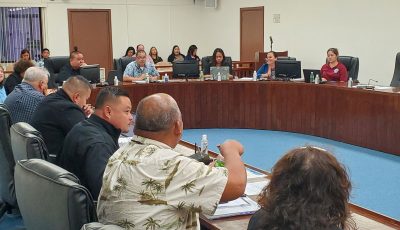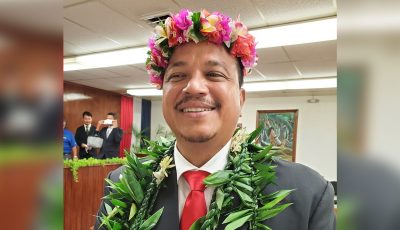DUE TO LOST, MISPLACED, OR DESTROYED DOCUMENTS:
PSS writes off $287K in ‘unliquidated’ travel advances
After months of deliberation on recurring deficiencies in its annual audit, the Board of Education has voted to retire some $287,793 in unliquidated travel expenditures from previous years.
The decision was reached, according to board chair Herman T. Guerrero, after the board determined that all efforts have been explored yet still failed to address the concern.
The Public School System’s yearly audit for the past 13 years indicated findings that included over $287,000 in travel costs that had not been reconciled in the system’s records.
Glenn Muña, PSS associate commissioner for administrative services, told the board that the unaccounted travel costs covered the period from 1998 through 1999.
“PSS is faced with the issue of unliquidated travel advances in the amount of $287,793.73 that had accumulated since 1998 to 1999 during the old Wang System. The question presented was how to properly account for this amount of unliquidated travel when the submitted travel documents were received but either lost, misplaced, or destroyed. In order to be thorough and proceed in accordance with all laws and regulations, PSS sought advice from its auditors,” said Muña in his letter to Guerrero dated April 24.
According to Muña, PSS auditors recommended that “if PSS knows that the travel actually occurred as authorized by the travel authorization and if the traveler affirms that all travel documents were submitted per regulations, then PSS is advised to zero out this unliquidated travel amount.”
He said that PSS proceeded accordingly and steps are now in place to make sure that this situation never happens again.
For some years now, audits on PSS records have been accorded a qualified opinion. A qualified opinion report is issued when the auditor encounters one of two types of situations that do not comply with generally accepted accounting principles. Because of this, PSS kept getting categorized as not a low-risk auditee.
Guerrero said the board’s decision to zero out the unliquidated travel advances is primarily to clean up the system’s audit.
“We wanted to clean up our audits and this finding [unliquidated travel advances] keeps showing every year in our report. Basically, the retirement of this cost is to rectify that specific finding which has been there for many years,” Guerrero told Saipan Tribune.
Guerrero said the fiscal year 2013 audit for PSS is expected to be finalized and completed sometime in June or July.
He disclosed that the $287,000 travel cost deficiency was cited in the audit performance, not because travels were not performed by personnel but as a result of untimely posting and filing of travel vouchers that complete the documentation process.
Additionally, with the central office transferring to different locations in the last few years—from Marianas Business Plaza to the NMI Retirement Fund Building on Capital Hill to Lower Base—it seemed that some records have been misplaced or disposed of.
This is besides the fact that in those years, the government—including the PSS—has shifted its financial system from Wang to JD Edwards, which he said screwed up the migration of documents and records.
Guerrero said the “unliquidated” travel expenditures were written off after determining that travels were actually performed. He admitted that laxity in policy also caused the “long-time deficiency.”



























